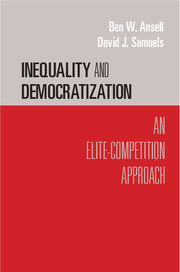Book contents
- Frontmatter
- Contents
- List of Tables
- List of Figures
- Preface
- I Introduction
- 2 Inequality, Development, and Distribution
- 3 Actors and Interests
- 4 An Elite-Competition Model of Democratization
- 5 Assessing the Relationship between Inequality and Democratization
- 6 Inequality and Democratization: Empirical Extensions
- 7 Democracy, Inequality, and Public Spending: Reassessing the Evidence
- 8 Democracy, Redistribution, and Preferences
- 9 Conclusion
- Bibliography
- Index
6 - Inequality and Democratization: Empirical Extensions
Published online by Cambridge University Press: 05 January 2015
- Frontmatter
- Contents
- List of Tables
- List of Figures
- Preface
- I Introduction
- 2 Inequality, Development, and Distribution
- 3 Actors and Interests
- 4 An Elite-Competition Model of Democratization
- 5 Assessing the Relationship between Inequality and Democratization
- 6 Inequality and Democratization: Empirical Extensions
- 7 Democracy, Inequality, and Public Spending: Reassessing the Evidence
- 8 Democracy, Redistribution, and Preferences
- 9 Conclusion
- Bibliography
- Index
Summary
INTRODUCTION
In this chapter, we explore additional empirical implications of our theoretical model. Our model suggests that income inequality should be a better predictor of bourgeois-led transitions to “partial” rather than “full” democracy, whereas land inequality should retard both types of regime transitions. We examine this question empirically by considering additional ways to operationalize democracy using the Polity index, and a variety of new empirical techniques to address this question.
We then consider how different paths of economic development might shape which forms of inequality matter most politically. Our formal model predicts that income inequality should hasten transitions to democracy where an emerging (industrial) sector is growing rapidly compared to a stagnant (agricultural) sector. Conversely, rural inequality should matter more when the agricultural sector is relatively larger than the industrial sector. Using the level of economic development to indicate the relative size of the industrial sector, we find support for this conjecture.
Finally, we consider the impact of asset mobility. Our model suggested that asset mobility has an ambiguous theoretical impact on regime change, because although it decreases the bourgeoisie's incentives to rebel it also increases the elite's incentives to grant democracy. Using a country's capital share of income to measure asset-mobility, we find weak support for the latter hypothesis. However, introducing this variable does not change the predicted impact of income or land inequality.
VARIETIES OF REGIMES
Here we explore our model's implication that inequality better predicts transitions to partial rather than full democracy. We do so in three steps. First, we examine the extent to which our argument can empirically distinguish transitions from autocracy to partial and/or full democracy by splitting political regimes into these three types and using Markov switching models. Second, we examine the effects of inequality across all possible thresholds along the Polity index, expecting weaker results as one approaches transitions across “most democratic” scores. Results using both approaches confirm our hypothesis that land and income inequality better predict transitions to partial democracy. Finally, we examine the impact of different forms of inequality on changes in different institutional elements of democracy, by breaking the Polity index into its components of executive recruitment, constraints on the executive, and political competition.
- Type
- Chapter
- Information
- Inequality and DemocratizationAn Elite-Competition Approach, pp. 124 - 140Publisher: Cambridge University PressPrint publication year: 2014



